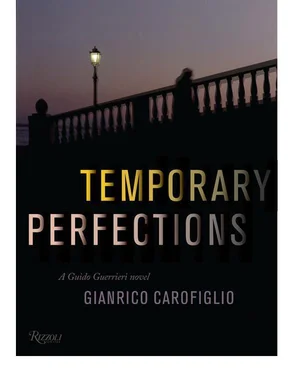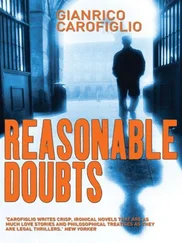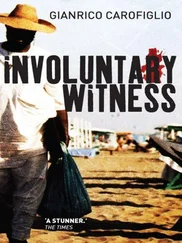Gianrico Carofiglio - Temporary Perfections
Здесь есть возможность читать онлайн «Gianrico Carofiglio - Temporary Perfections» весь текст электронной книги совершенно бесплатно (целиком полную версию без сокращений). В некоторых случаях можно слушать аудио, скачать через торрент в формате fb2 и присутствует краткое содержание. Жанр: Криминальный детектив, на английском языке. Описание произведения, (предисловие) а так же отзывы посетителей доступны на портале библиотеки ЛибКат.
- Название:Temporary Perfections
- Автор:
- Жанр:
- Год:неизвестен
- ISBN:нет данных
- Рейтинг книги:3 / 5. Голосов: 1
-
Избранное:Добавить в избранное
- Отзывы:
-
Ваша оценка:
- 60
- 1
- 2
- 3
- 4
- 5
Temporary Perfections: краткое содержание, описание и аннотация
Предлагаем к чтению аннотацию, описание, краткое содержание или предисловие (зависит от того, что написал сам автор книги «Temporary Perfections»). Если вы не нашли необходимую информацию о книге — напишите в комментариях, мы постараемся отыскать её.
Temporary Perfections — читать онлайн бесплатно полную книгу (весь текст) целиком
Ниже представлен текст книги, разбитый по страницам. Система сохранения места последней прочитанной страницы, позволяет с удобством читать онлайн бесплатно книгу «Temporary Perfections», без необходимости каждый раз заново искать на чём Вы остановились. Поставьте закладку, и сможете в любой момент перейти на страницу, на которой закончили чтение.
Интервал:
Закладка:
It was what’s called a “Form 44 file,” in reference to the papers filed in cases with unknown defendants. Printed on the cover were the name of the missing person, the date of her disappearance, and the classification of the crime-Article 605 of the Italian Penal Code, abduction. This is the only crime heading that can be invoked when a person disappears and there is no evidence to support other, more specific theories.
The first document in the file was the report from the Carabinieri-signed by Inspector Navarra, a non-commissioned officer I knew and respected-informing the prosecutor’s office of the existence of the missing persons report filed by the parents and the transcripts of the investigation’s early interviews.
I began with the statement of the young woman who had taken Manuela to the train station. Anita Salvemini-that was her name-had also been a guest at the trulli where Manuela spent the weekend. She’d given Manuela a ride because she was going to Ostuni to meet some friends, but that was the first and only time they’d met.
During the twenty minutes of the short car trip from the trulli to the train station, they chatted about inconsequential matters. Manuela told her she was studying law in Rome and said she planned to return to Rome by train later that evening or the next morning.
No, Anita didn’t know whether Manuela was planning to meet someone at the Bari train station, nor did she know if Manuela was seeing anyone, had a boyfriend, and so on.
No, Manuela hadn’t seemed worried to her. Moreover, she hadn’t really observed her carefully for the obvious reason that she-Anita-was driving the car, and she therefore needed to keep her eyes on the road.
No, she didn’t recall Manuela making or receiving any calls during the car trip between the trulli and the Ostuni train station. Manuela may have taken her cell phone out of her purse at some point. Maybe she got a text, or sent one, but Anita couldn’t really say with any certainty.
No, she couldn’t remember exactly how Manuela was dressed that afternoon. She’d definitely had a large dark-colored bag with her, and a smaller purse, and she thought she might have been wearing jeans and a light-colored t-shirt.
No, she couldn’t remember the exact time of their departure from the trulli, nor could she remember exactly when they arrived at the train station and she said good-bye to Manuela. They probably left a little after four, which would mean they got there around 4:30.
No, she couldn’t say exactly when Manuela’s train was scheduled to depart. Probably shortly after they arrived at Ostuni, but that was a guess, because she had no memory of having talked about it.
No, she had nothing more to add.
Read, approved, and signed.
After that deposition came the statements of the three friends-two young women and a young man-who’d been at the trulli with Manuela. These three statements were short and said basically the same thing: They’d planned to return to Bari on Sunday night. Then, because there was a party, the three friends had decided to stay until Monday. Manuela still wanted to go home on Sunday, as they had originally planned. She told them not to worry, because she’d found a ride to Ostuni, and she planned to catch a train there.
The end.
Then came the statement of the ticket clerk Fornelli had mentioned. The clerk recognized Manuela, though he didn’t know what time she’d come to his window to buy her ticket.
From the report, it appeared that the Carabinieri had checked the schedule for trains departing the station of Ostuni. Manuela could have taken either a Eurostar, an express, or one of two locals between 5:02 P.M. and 6:58 P.M.
The Carabinieri had been very thorough and had interviewed the conductors on all those trains: There were ten or so statements-all identical, nearly all useless.
The conductors were each shown a photograph of the girl, and they answered that they couldn’t remember ever having seen her.
Only one, the conductor on the 6:50 train, said that Manuela’s face was familiar. He thought he’d seen that girl before, but he wasn’t sure if it had been on Sunday afternoon or some other time.
There followed a series of transcripts of the statements of the other young people who’d spent the weekend at the trulli. None of the statements was even remotely useful. Only one thing caught my attention: The Carabinieri asked everyone whether narcotics had been used over the weekend. Everyone interviewed ruled that out, but no one had been able-or willing-to say whether Manuela ever used drugs, even occasionally.
Then there was the sketchy information obtained from two of Manuela’s friends who were also students in Rome: Nicoletta Abbrescia-the girl who shared an apartment with Manuela-and Caterina Pontrandolfi.
The Carabinieri had asked them about drugs, too. Both admitted that Manuela might have smoked a joint every now and then, but said she never used anything stronger. Between the lines of the bureaucratic language, there were glimpses of embarrassment and perhaps even reticence, but that was probably normal and understandable, since the conversation was, after all, with the Carabinieri.
But the most interesting part of their depositions concerned a certain Michele Cantalupi, Manuela’s most recent boyfriend. Both young women described a troubled relationship, marked by frequent fights, that came to a stormy end that included verbal and even physical violence.
The Carabinieri reported that in the days immediately following Manuela’s disappearance they had not been able to track down Cantalupi. His parents told them that their son was on vacation, out of the country. The detectives were puzzled by their responses (in the report, they wrote that the parents’ attitude had seemed somewhat evasive), and they requested authorization to pull the records for Cantalupi’s cell phone, as well as those for Manuela’s cell phone and her ATM records. They wanted to see with whom they’d been in contact most recently and more importantly to determine whether Cantalupi really had been out of the country for several days.
One week later, in another long report, the Carabinieri detailed a number of further steps that had been taken in the investigation. First, they had conducted an interview with Michele Cantalupi, who had returned from his vacation in the meantime. Cantalupi confirmed that he had been Manuela’s boyfriend for nearly a year; he confirmed that the relationship had ended badly, but he pointed out that it was all over many months prior to her disappearance, and that in fact they’d been on much better terms lately. The relationship had ended for a variety of reasons, and Manuela was the one who decided to end it. He admitted that there had been fights, some of them violent. He also admitted that on occasion those fights had taken place in the presence of friends. No, there had never been any assault, no punches thrown. He was informed that one of Manuela’s girlfriends said that during a fight, in her presence, slaps had been exchanged. He admitted that there had in fact been a slap, but said that it had been Manuela who slapped him, not the other way around. He admitted that he shoved her and said she reacted by slapping him. That was the end of it, and that was also the only time there had been any form of physical conflict. No, he didn’t have another girlfriend now. No, he didn’t know whether Manuela was seeing someone else in Rome. He admitted that he had asked her, but she told him it was none of his business. Yes, they had met once, they’d had a cup of coffee together and chatted a while. This was in downtown Bari, in early August. No, there had been no conflict. They had said good-bye amicably.
I found the transcript puzzling. Reading between the lines of the police report, you could see Cantalupi trying to make it all sound normal and peaceful, when, perhaps, it wasn’t completely peaceful, at least not according to Manuela’s girlfriends.
Читать дальшеИнтервал:
Закладка:
Похожие книги на «Temporary Perfections»
Представляем Вашему вниманию похожие книги на «Temporary Perfections» списком для выбора. Мы отобрали схожую по названию и смыслу литературу в надежде предоставить читателям больше вариантов отыскать новые, интересные, ещё непрочитанные произведения.
Обсуждение, отзывы о книге «Temporary Perfections» и просто собственные мнения читателей. Оставьте ваши комментарии, напишите, что Вы думаете о произведении, его смысле или главных героях. Укажите что конкретно понравилось, а что нет, и почему Вы так считаете.












